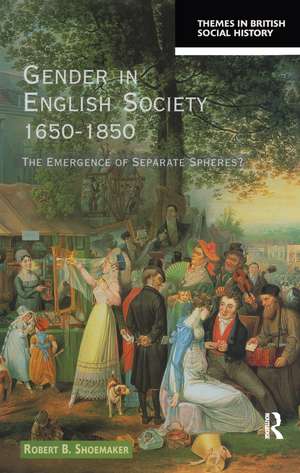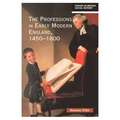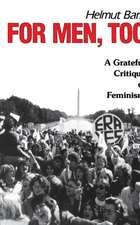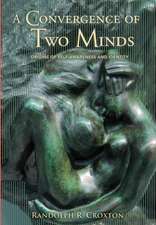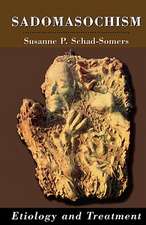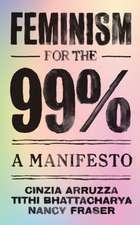Gender in English Society 1650-1850: The Emergence of Separate Spheres?: Themes In British Social History
Autor Robert B. Shoemakeren Limba Engleză Hardback – 2 mar 2017
| Toate formatele și edițiile | Preț | Express |
|---|---|---|
| Paperback (1) | 373.67 lei 3-5 săpt. | +29.87 lei 6-10 zile |
| Taylor & Francis – 6 mar 1998 | 373.67 lei 3-5 săpt. | +29.87 lei 6-10 zile |
| Hardback (1) | 764.20 lei 6-8 săpt. | |
| Taylor & Francis – 2 mar 2017 | 764.20 lei 6-8 săpt. |
Preț: 764.20 lei
Preț vechi: 1154.58 lei
-34% Nou
Puncte Express: 1146
Preț estimativ în valută:
146.25€ • 151.08$ • 121.72£
146.25€ • 151.08$ • 121.72£
Carte tipărită la comandă
Livrare economică 26 martie-09 aprilie
Preluare comenzi: 021 569.72.76
Specificații
ISBN-13: 9781138157071
ISBN-10: 1138157074
Pagini: 346
Dimensiuni: 138 x 216 mm
Greutate: 0.45 kg
Ediția:1
Editura: Taylor & Francis
Colecția Routledge
Seria Themes In British Social History
Locul publicării:Oxford, United Kingdom
ISBN-10: 1138157074
Pagini: 346
Dimensiuni: 138 x 216 mm
Greutate: 0.45 kg
Ediția:1
Editura: Taylor & Francis
Colecția Routledge
Seria Themes In British Social History
Locul publicării:Oxford, United Kingdom
Cuprins
Chapter 1 Introduction, Robert B. Shoemaker; Chapter 2 Ideas about Gender, Robert B. Shoemaker; Chapter 3 Sexuality, Robert B. Shoemaker; Chapter 4 Family and Household Life, Robert B. Shoemaker; Chapter 5 Work, Robert B. Shoemaker; Chapter 6 Religion and Politics, Robert B. Shoemaker; Chapter 7 Social and Cultural Life, Robert B. Shoemaker; Chapter 8 Conclusion: The Emergence of Separate Spheres?, Robert B. Shoemaker; backmatter1 Robert B. Shoemaker is a Lecturer in History at the University of Sheffield, Robert B. Shoemaker;
Descriere
A lively social history of the respective roles of men and women xxx; from workplace to household, from parish church to alehouse, from market square to marriage bed. Robert Shoemaker investigates such varied topics as crime, leisure, the theatre, religious observance, notions of morality and even changing patterns of sexual activity itself. He draws on his own research as well as the exciting new scholar-ship now available on gender history. Throughout he critically re-examines the theory of 'separate spheres', challenging the view that women had greater economic and political opportunities in pre-industrial Britain.
